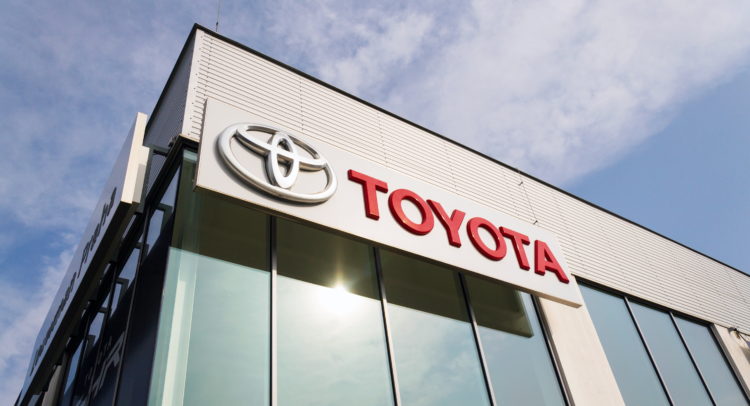It’s not every day that the conservative-leaning editorial arm of Fox News sings the praises of Japanese companies. However, that was what occurred when former Arkansas Governor Mike Huckabee affirmed the position of Toyota (NYSE:TM) regarding electric vehicles. Contrasting with peers, Toyota CEO Akio Toyoda declared that he’s part of the industry’s silent majority in questioning EV exclusivity. Once an oddball, TM stock deserves further investigation. I am long-term bullish on the stock.
Confident Investing Starts Here:
- Easily unpack a company's performance with TipRanks' new KPI Data for smart investment decisions
- Receive undervalued, market resilient stocks right to your inbox with TipRanks' Smart Value Newsletter
Fundamentally, EVs may very well represent the future of mobility. Although their production requires an expenditure on natural resources and environmentally-unfriendly manufacturing processes, once rolled off the assembly line, their day-to-day operation features zero emissions. With climate change and concerns about geopolitical energy dependencies rising to the forefront, EVs seem to offer a win-win solution. However, Toyota doesn’t quite see it that way, leading to questions about TM stock.
It’s not that the famous automaker doesn’t care about electrification. Around this time last year, Toyota announced plans to invest $35 billion to launch 30 EVs by 2030. Rather, Toyota refuses to go all-in on EVs, which makes TM stock both compelling and risky. If EVs become the exclusive standard for vehicular travel, Toyota could lag behind the competition. On the flip side, if combustion-powered vehicles remain relevant, the company would be in an enviable position.
To be fair, Toyoda never stated that he was anti-EV. “Because the right answer is still unclear, we shouldn’t limit ourselves to just one option,” he said, per The Wall Street Journal. Sure enough, Fox News’ internet commentators – who typically don’t share much love for foreign companies that compete with American enterprises – praised Toyota’s contrarian move.
By the numbers, they might be right on this particular issue.
TM Stock May Benefit from Modulated Approach to EVs
To reiterate, Toyota is hardly an anti-EV company. It invests in the underlying technology along with other approaches, particularly hybrid. Instead, management urges flexibility ahead of a difficult-to-navigate economic environment, and it’s this smart and conscientious strategy that may boost TM stock in the long run.
Primarily, a massive impediment to broader EV integration is cost. Early in 2022, the average transaction price for a new EV stood at $62,876. Given that the pre-pandemic U.S. household income was $69,560, not too many people can reasonably afford an EV. Combined with the destruction of the dollar’s purchasing power and rising layoffs, fewer people are interested in making the transition.
Second, technical issues pose major challenges for the EV exclusive. As TipRanks reporter Sweta Jaiswal mentioned, the U.S. “has nearly 124,000 public chargers that take long hours to charge.” Further, another WSJ report mentioned that the government seeks to raise this number to 500,000 public chargers. However, Jaiswal points out that McKinsey & Co. projects a requirement of 1.2 million chargers for EV integration to be viable.
Further, charging infrastructure alone won’t lead to a mass transition to EVs. For instance, while The Washington Post argues that EVs are the future, the news agency also acknowledges that the power grid isn’t ready. By one study, the U.S. will need to invest as much as $125 billion by 2030 to accommodate EVs.
Unfortunately, this number may be understated. For example, in California – the richest state in the Union – its grid couldn’t handle people turning on their air conditioners. Therefore, policymakers and private companies proposed renewable energy infrastructure investments to reduce the strain. However, millions of households plugging in their EVs would require a far greater upgrade.
Is TM Stock a Buy, According to Analysts?
Turning to Wall Street, TM stock has a Hold consensus rating based on zero Buys, three Holds, and zero Sell ratings. The average TM price target is $152.40, implying 13.6% upside potential.

Interestingly, on TipRanks, TM stock has a 7 out of 10 Smart Score rating. This indicates that the stock is likely to perform in line with the overall market but is just one point away from receiving an “outperform” rating.

Takeaway: Toyota Might Come Out Ahead Financially
Although Toyota’s decision to carefully move into electrification may seem awfully conservative, it’s also arguably sensible. Frankly, those betting on an exclusive EV future may spark catastrophic damage to their financials if they get it wrong. Thus, TM stock appears rather reasonable.
Currently, on a trailing-12-month basis, Toyota’s profitability margins rate decently though not superbly. For instance, its net margin is 7.43%, ranked better than 77% of the industry. In turn, its return on equity – or the ability to convert equity into profits – is 9.51%. Here, this stat rates better than nearly 63% of the competition – good but not great.
Further, its three-year revenue growth rate stands at 2.9%. This ranks better than 57.5% of its peers, which is a challenge for TM stock. If Toyota goes EV exclusive, it may have to wait years for either consumers to boost their income or for economies of scale to drive down production costs. Neither outcome looks promising at the moment.
Right now and arguably for the foreseeable future, Toyota dominates the average-income segment. If society incurs a recession, Toyota is better positioned than the EV-exclusive competition. Therefore, TM stock is more intriguing than it initially appears on paper.
Looking for a trading platform? Check out TipRanks' Best Online Brokers , and find the ideal broker for your trades.
Report an Issue









